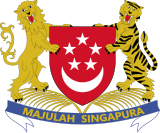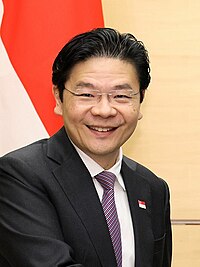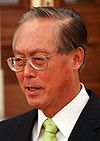
The Government of Barbados (GoB), is a unitary parliamentary republic, where the President of Barbados is the head of state and the Prime Minister of Barbados is the head of government.

Singapore is a parliamentary representative democratic republic in which the president of Singapore is the head of state, the prime minister of Singapore is the head of government, and of a multi-party system. Executive power is exercised by the Cabinet from the parliament, and to a lesser extent, the president. Cabinet has the general direction and control of the government and is accountable to Parliament. There are three separate branches of government: the legislature, executive and judiciary abiding by the Westminster system. Singapore has been described as being a de facto one-party state.

Lee Kuan Yew, often referred to by his initials LKY, was a Singaporean statesman and lawyer who served as the first Prime Minister of Singapore from 1959 to 1990, and Secretary-General of the People's Action Party from 1954 to 1992. He was the Member of Parliament (MP) for Tanjong Pagar from 1955 until his death in 2015. Lee is widely recognised as the founding father of the modern Singaporean state, and for his leadership in turning it into a highly developed country under his tenure.

The People's Action Party (PAP) is a major conservative political party of the centre-right in Singapore. It is one of the three contemporary political parties represented in the Parliament of Singapore, alongside the Workers' Party (WP) and the Progress Singapore Party (PSP).
A presidency is an administration or the executive, the collective administrative and governmental entity that exists around an office of president of a state or nation. Although often the executive branch of government, and often personified by a single elected person who holds the office of "president", in practice, the presidency includes a much larger collective of people, such as chiefs of staff, advisers and other bureaucrats. Although often led by a single person, presidencies can also be of a collective nature, such as the presidency of the European Union is held on a rotating basis by the various national governments of the member states. Alternatively, the term presidency can also be applied to the governing authority of some churches, and may even refer to the holder of a non-governmental office of president in a corporation, business, charity, university, etc. or the institutional arrangement around them. For example, "the presidency of the Red Cross refused to support his idea." Rules and support to discourage vicarious liability leading to unnecessary pressure and the early termination of term have not been clarified. These may not be as yet supported by state let initiatives. Contributory liability and fraud may be the two most common ways to become removed from term of office and/or to prevent re-election.
A motion or vote of no confidence is a formal expression by a deliberative body as to whether an officeholder is deemed fit to continue to occupy their office. The no-confidence vote is a defining feature of parliamentary democracy which allows the elected parliament to either affirm their support or force the ousting of the cabinet. Systems differ in whether such a motion may be directed against the prime minister only or against individual cabinet ministers.

Goh Chok Tong is a Singaporean former politician who served as the second Prime Minister of Singapore from 1990 to 2004 and Secretary-General of the People's Action Party (PAP) from 1992 to 2004. He was the Member of Parliament (MP) for Marine Parade SMC from 1976 to 1988, and Marine Parade GRC from 1988 to 2020.

The president of South Africa is the head of state and head of government of the Republic of South Africa. The president directs the executive branch of the government and is the commander-in-chief of the South African National Defence Force. Between 1961 and 1994, the office of head of state was the state presidency.

The president of the Republic of Singapore is the head of state of Singapore. The president represents the country in official diplomatic functions and possesses certain executive powers over the Government of Singapore, including the control of the national reserves and the ability to revoke and appoint public service appointments.

Lee Hsien Loong is a Singaporean politician and former brigadier-general who has been a Senior Minister of Singapore since 2024, having previously served as the third Prime Minister of Singapore from 2004 to 2024. He has been the Member of Parliament (MP) for the Teck Ghee division of Ang Mo Kio GRC since 1991, and previously Teck Ghee SMC between 1984 and 1991, as well as Secretary-General of the People's Action Party (PAP) since 2004.

The president of the Republic of Trinidad and Tobago is the head of state of Trinidad and Tobago and the commander-in-chief of the Trinidad and Tobago Defence Force. The office was established when the country became a republic in 1976, before which the head of state was the Queen of Trinidad and Tobago, Elizabeth II. The last governor-general, Sir Ellis Clarke, was sworn in as the first president on 1 August 1976 under a transitional arrangement. He was formally chosen as president by an electoral college consisting of members of both houses of Parliament on 24 September 1976, which is now celebrated as Republic Day.

The Government of Singapore is defined by the Constitution of the Republic of Singapore to consist of the President and the Executive. Executive authority of Singapore is vested in the President but exercised on the advice of the Cabinet led by the Prime Minister. The President, acting as the Head of State, may only act in their discretion in appointing the Prime Minister, acting as the Head of Government; as well as withholding consent for the dissolution of Parliament; along with performing key checks on the Government in addition to the ceremonial duties of the Head of State inherited from the Westminster system. The Cabinet, consisting of the Prime Minister and ministers appointed by the President on the Prime Minister's advice, is responsible for heading the Executive through ministries and other statutory boards. At the end of the term or at any time during the term, once the President has consented to a request made by the Prime Minister to dissolve Parliament, Parliamentary General Elections are held to elect members of Parliament for a new term. The President, in their discretion, then appoints a Prime Minister who is a member of Parliament representing any political party or coalition of political parties who in their judgement is likely to command the confidence of the majority of the members of Parliament. The Prime Minister then forms the Government and, along with the Cabinet, sets the general direction and control of the Government for the next term.

The Cabinet of Singapore forms the executive branch of the Government of Singapore together with the President. It is led by the Prime Minister who is the head of government. The prime minister is a Member of Parliament (MP) appointed by the president who in the president's judgment is likely to command the confidence of the majority of the Members of Parliament (MPs). The other Ministers in the Cabinet are Members of Parliament appointed by the president acting in accordance with the advice of the prime minister. Ministers are prohibited from holding any office of profit and from actively engaging in any commercial enterprise.
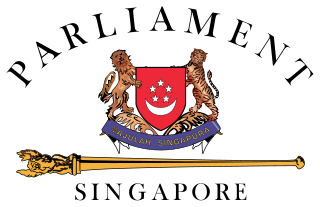
The Parliament of Singapore is the unicameral legislature of the Republic of Singapore, which governs the country alongside the president of Singapore. Largely based upon the Westminster system, the Parliament is made up of Members of Parliament (MPs) who are elected, as well as Non-constituency Members of Parliament (NCMPs) and Nominated Members of Parliament (NMPs) who are appointed. Following the 2020 general election, 93 MPs and two NCMPs from three political parties were elected to the 14th Parliament. Throughout the sitting of Parliament, nine NMPs are usually appointed by the president on a biennial basis.
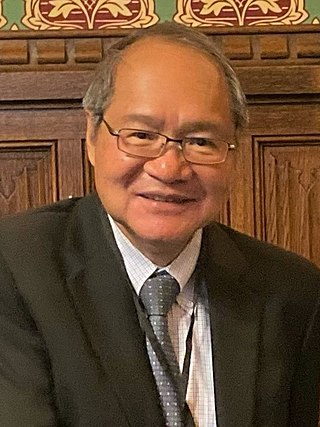
The attorney-general of Singapore is the public prosecutor of the Republic of Singapore and legal adviser to the Government of Singapore. The attorney-general is the head of the Attorney-General's Chambers (AGC), whose staff carries out the functions of the attorney-general. The attorney-general is appointed by the president, on the advice of the prime minister, under Article 35 of the Constitution of Singapore. Unlike some countries that follow the Westminster parliamentary model, the attorney-general is not a Member of Parliament.

Howe Yoon Chong was a Singaporean politician and civil servant who served as Minister for Defence between 1979 and 1982, and Minister for Health between 1982 and 1985. A member of the governing People's Action Party (PAP), he was the Member of Parliament (MP) for Potong Pasir SMC between 1979 and 1984.

Judicial independence is protected by Singapore's Constitution, statutes such as the State Courts Act and Supreme Court of Judicature Act, and the common law. Independence of the judiciary is the principle that the judiciary should be separated from legislative and executive power, and shielded from inappropriate pressure from these branches of government, and from private or partisan interests. It is crucial as it serves as a foundation for the rule of law and democracy.

Singapore–Taiwan relations are the international relations between Singapore and Taiwan. Taiwan has a representative office in Singapore. Singapore operates the Singapore Trade Office in Taipei in Taiwan, both of whom are members of the World Trade Organization (WTO). The Presidential Envoy of ROC and Prime Minister of Singapore regularly meet, in the form similar to private state-to-state gesture diplomacy at APEC.

On 23 March 2015, Lee Kuan Yew, the founding prime minister of Singapore and co-founder of the People's Action Party, died at the age of 91 at 03:18 Singapore Standard Time (UTC+08:00), after having been hospitalised at the Singapore General Hospital with severe pneumonia since 5 February that year. A formal announcement was made on national television and radio by Prime Minister Lee Hsien Loong at 08:00 that morning.

The president of Barbados is the head of state of Barbados and the commander-in-chief of the Barbados Defence Force. The office was established when the country became a parliamentary republic on 30 November 2021. Before, the head of state was Elizabeth II, Queen of Barbados, who was represented on the island by a governor-general. The first and current president is Sandra Mason, who previously served as the last governor-general.


